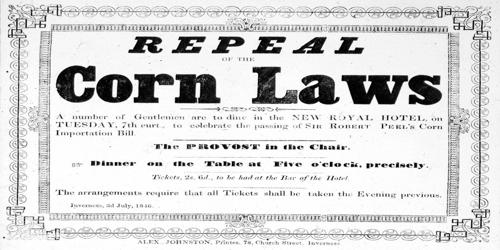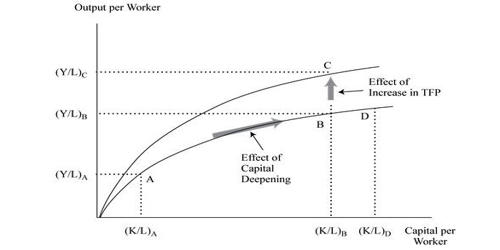The Corn Laws were tariffs and other trade restrictions on imported food and grain (“corn”) enforced in the United Kingdom between 1815 and 1846. The Corn Laws caused the price of ‘corn’, which also includes barley, corn, wheat, and all other grains, to increase. In English history, it is any of the regulations governing the import and export of grain. The word ‘corn’ in British English denotes all cereal grains, including wheat, oats, and barley. They were designed to keep grain prices high to favor domestic producers and represented British mercantilism. The Laws were designed to protect English farmers from inexpensive foreign imports of grain. The Corn Laws blocked the import of cheap grain, initially by simply forbidding importation below a set price, and later by imposing steep import duties, making it too expensive to import grain from abroad, even when food supplies were short.
The Corn Laws enhanced the profits and political power associated with land ownership. The Corn Law of 1815 is perhaps the most misunderstood piece of legislation in modern British history. The laws became politically important in the late 18th century and the first half of the 19th century, during the grain shortage caused by Britain’s growing population and by the blockades imposed in the Napoleonic Wars. The laws raised food prices and the costs of living for the British public, and hampered the growth of other British economic sectors, such as manufacturing, by reducing the disposable income of the British public. During the Napoleonic Wars, it had not been possible to import corn from Europe. This led to an expansion of British wheat farming and to high bread prices.
The laws became the focus of opposition from urban groups who had far less political power than rural areas. The first two years of the Great Famine in Ireland of 1845–1849 forced a resolution because of the urgent need for new food supplies. The industrial classes saw the Corn Laws as an example of how Parliament passed legislation that favored large landowners. The Prime Minister, Sir Robert Peel, a Conservative, achieved repeal with the support of the Whigs in Parliament, overcoming the opposition of most of his own party. The manufacturers, in particular, was concerned that the Corn Laws would result in a demand for higher wages.
The Corn Laws had an important political impact on Manchester. It was one of the main reasons why the group of middle-class moderate reformers began meeting at the home of John Potter. Economic historians see the repeal of the Corn Laws as a decisive shift toward free trade in Britain. The Corn Laws were finally repealed in 1846, a triumph for the manufacturers, whose expansion had been hampered by the protection of grain, against the landed interests.
















